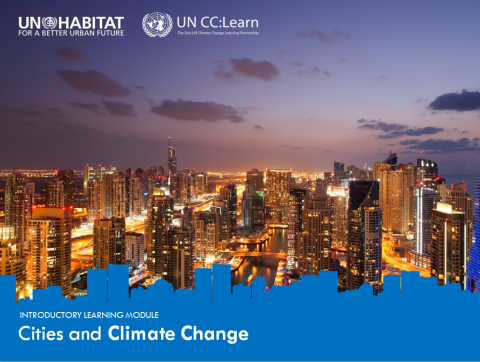
Cities and Climate Change
IMPORTANT: Please register directly on the course website: http://unccelearn.org/
This specialised module introduces the theme of climate change in urban areas. The world is becoming more and more urban, and therefore cities are important actors in addressing climate change. The module will cover both how cities are affected by climate change and how cities are contributing to climate change. In addition, the module will look at how climate change adaptation and mitigation can be considered in urban planning and identify concrete measures. Several examples of how cities can play a transformational role in addressing climate change are presented.
After completing this specialised module, participants will be able to:
- Describe urban trends for the 21st century.
- Describe the transformative role that cities can play in achieving green and climate resilient development.
- Explain how urban areas are affected by, and contribute to, climate change.
- Explain how climate change adaptation and mitigation can be considered in urban planning.
- Identify specific adaptation and mitigation measures suitable for urban areas.
The course is structured around six modules:
- Cities in the 21st century
- Effects of climate change on cities
- Cities as contributors to climate change
- Integrating climate change adaptation and mitigation in urban planning
- Urban climate change adaptation and mitigation in practice
- Overview of major initiatives related to climate change and cities
The course should be of particular interest to the following audiences:
- Civil servants in national ministries, provincial departments and local authorities;
- Environmental managers in private sector and civil society organizations;
- Faculty, researchers and students; and
- Interested citizens.
UN CC:Learn is a partnership of more than 30 multilateral organizations supporting countries to design and implement systematic, recurrent and results-oriented climate change learning. At the global level, the partnership supports knowledge-sharing, promotes the development of common climate change learning materials, and coordinates learning interventions through a collaboration of UN agencies and other partners. At the national level, UN CC:Learn supports countries in developing and implementing national climate change learning strategies. Through its engagement at the national and global levels, UN CC:Learn contributes to the implementation of Article 6 of the UNFCCC on training, education and public awareness-raising, and the 2012-2020 Doha Work Programme. Funding for UN CC:Learn is provided by the Swiss Government and UN partners. The Secretariat for UN CC:Learn is hosted by the UN Institute for Training and Research (UNITAR).

